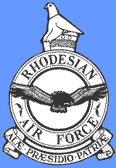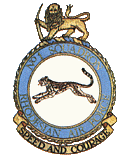Photo Gallery
Mike Mulligan and the Barrier
Avpin, uses of
Colin Graves Accident 1959
Early History of No 1 Squadron
Air Force Home Page
Site Home Page
Formation
No. 1 Squadron was reformed in March1951.
Motto
"Speed and Courage"
Roles
The role of No. 1 Squadron was that of ground attack and air defence.
A Brief History
1951
The unit was established in March 1951 to operate Spitfire F22s that were delivered to Southern Rhodesia. It was manned by regular force pilots, and operated out of Cranborne Air Base.
1952
The squadron moved to New Sarum Air Base south of Salisbury in October 1952.
1956
In
January 1956 the squadron was re-equipped with Vampire FB 9 aircraft.
1958
On the 4th January 1958 the squadron took the
Vampires on their first detachment to RAF Khormaksa. Thereafter they
made annual overseas deployments until 1963.
1962
In 1962 the squadron moved from New Sarum to Thornhill Air Base, Gwelo.
During December 1962 the squadron was e-equipped with twelve
Hawker Hunter FGA9 aircraft.
1963
In
1963 the existing Vampire aircraft were transferred to No 2 Squadron.
1966
April 1966 Sqn Ldr Chris Dams posted as OC N0.
1 Squadron.
1968
In February 1968 the
arrester barrier at Thornhill was used for the first time when a Hunter
overran the runway. Only superficial damage was caused to the aircraft.
1969
In 1969 No. 1 Squadron in conjunction with No.
4 Squadron continued to work on airborne Forward Air Control (FAC)
which had first been used in 1968.
1969 No. 1 Squadron carried out trails with an 18lb rocket projectile which was adopted as a standard internal security weapon.
Flight Lieutenant Rich Brand led a formation of Hunters in a fly past over Bulowayo and Salisbury to commemorate the 50th anniversary of the first flight by an aircraft in Rhodesia, when the Silver Queen II, flown by Sir Quintin Brand his uncle, landed at Bulowayo racecourse on 5th March 1920.
1973
On the 21st September 1973,
No. 1 Squadron was presented with its standard or colours depicting No
237 (Rhodesia) Squadron Battle Honours. It was the first Rhodesian Air
Force Squadron to be presented with a standard.
On the 23rd May 1973 two hunters conducted a Navigation Exercise from Thornhill to Luanda, in Angola. On departure from Luanda the lead aircraft experienced an engine surge and decided to divert into Nova Lisboa. Eventually a Dakota crewed by Flight Lieutenant Ivan Holtshausen and Air Lieutenant Ed Paintin arrived with a ground crew and spares. The aircraft was repaired and all the aircraft then returned to Rhodesia.
20th June 1973 Flight Lieutenant DAG Jones became the first Rhodesian pilot to fly 1,000 hours in a Hawker Hunter
21st September 1973 No.
1 Squadron was presented with its Standard by Air Marshal Mick Archie
Wilson
Pervious Squadron Commanders G. A. Smith, John
Walmisley, Eric Smith, Ian Shand.
1974
Early 1974, Squadron Leader Rob Gaunt had to use the
barrier at Thornhill to stop his aircraft from ending up on the Umvuma
road.
On Sunday 14th April 1974, two Hunters of No 1 Squadron whilst searching for a Trojan that was missing in Mozambique, were fired at with SAM-7 heat seeking missile. This was the first occasion that a strella missile was known to have been used against Rhodesian aircraft.
On the 17th May 1974
No. 1 Squadron was presented with the Jacklin Trophy. Deputy Minister
for the Office of the Prime Minister – Mr. Wickus de Kock
made the presentation. The Trophy was accepted by Squadron Leader Rob
Gaunt.
Post Zimbabwe Independence (1981)
During 1981 the squadron received four Hawker Hunter FGA 80 aircraft and one T 81 training aircraft.
About the Hawker Hunter
Very nearly 2000 Hunters were produced between 1951 and 1963. In addition to the RAF, Hunters were supplied to the air forces of
Sweden, Switzerland, Holland, Denmark, Belgium, Chile, Peru, India, Singapore, Saudi Arabia, Jordan, Lebanon, Qatar, Kuwait, Oman,
Iraq, Abu Dhabi, Rhodesia and Kenya. One aeroplane served with no less than 7 air forces and one air force had Hunters in operational
use for 5 decades. No other front line fighter has ever come close to this.
In his book "Hawker Hunter - Biography of a Thoroughbred" Francis K Mason points out that following the embargo placed upon trade with
Rhodesia, "……no follow-up servicing of its Hunters nor delivery of spare parts were permissible. All the more remarkable therefore was
the fact that nine of the original twelve Hunters were still flying with the Zimbabwe-Rhodesian Air Force at the end of the 1970s with
only local facilities available for maintenance and repair; the aircraft had moreover been continuously engaged throughout their life
in rigorous ground attack flying."
Under a photo of RRAF 116 the caption reads: "Despite years of constant use under most difficult
conditions, almost entirely without external support and spares back-up, the Rhodesian Hunters maintained an extraordinarily high
serviceability rate." A fitting tribute to the fantastic technical team that existed in our beloved Rhodesian Air Force.
Squadron Commanders
 Flt Lt Archie Wilson |
 Flt Lt Dickie Bradshaw |
Flt Lt Charlie Paxton Aug 1957 - Jun 59 |
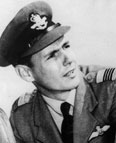 Flt Lt Colin Graves Jun 59 - July 59 |
Sqn Ldr Sandy Mutch Jul 1959 - May 1961 |
Sqn Ldr John Mussell 1 Jun 1961 -30 Mar 63 |
Sqn Ldr Mike Saunders 1 Apr 1963 - 30 Apr 64 |
 Sqn Ldr N Walsh 4 May 64 to 28 Apr 66 |
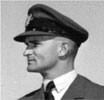 Sqn Ldr Chris Dams April 1966 - Sept 1967 |
Sqn Ldr E. J. Brent Oct 1967 - March 1969 |
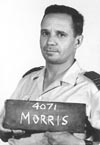 Sqn Ldr Roy Morris April 1969 - Sept 1971 |
Sqn Ldr R Du Rand October 1971 - June 1972 |
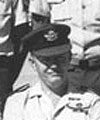
Sqn Ldr Keith Corrans July 1972 -Dec 1972 Detached to Op Sand |
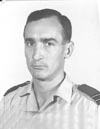 Flt Lt D.A.G.Jones (Acting) July 1972 - Nov 1972 |
Sqn Ldr R.J. Gaunt Jan 1973 - Dec 1975 |
Sqn Ldr Rickie Brand Jan 1976 - May 1978 |
Sqn Ldr C. L. Wightman June 1978 - July 1980 |
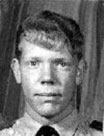 Sqn Ldr Tony Oakley Jan 1981 - May 1982 |
